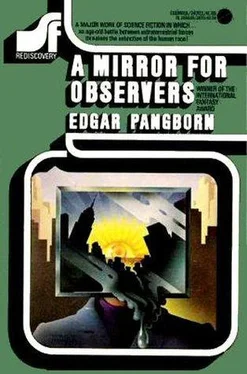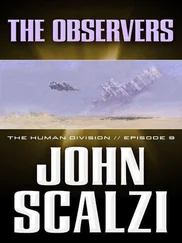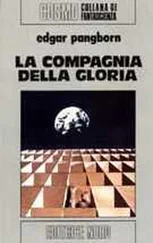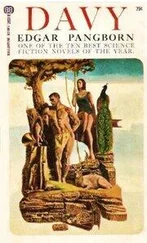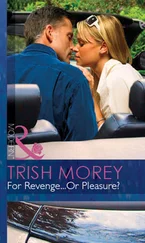When I said nothing more and made no move to take out the mirror, Sharon spoke with her head drowsy again on Abraham’s shoulder: “Will, don’t be so damn gentle.”
“Really I’m not. But I learned some years back that human nature is volatile stuff in a world full of lighted matches.”
Meeting my eyes tranquilly, Abraham said: “We wouldn’t be scared to look, Will.”
I unfastened the mirror from the strap hidden under my shirt, the same strap that holds my old grenade and the new one Supply sent me, and put it in Abraham’s hand. They gazed into it, two young and uncorrupted faces side by side. Not so very young. Twenty-one and nineteen. But out of certain black places even I could never explore, Twenty-one had groped his way, undefiled; and Nineteen was a grown-up, proud, and humble priestess in what may be the greatest of the arts.
Drozma, I felt the beginning of that peace which we Observers know when the end of a mission is not far away. What Abraham had predicted was not quite true: they were frightened. That was almost unimportant. What mattered was that nothing they felt — fright, shock, amazement, disappointment — made them turn away from what they saw. I can’t know what that was. They are both articulate with words. They also knew as I did that this was beyond the narrow territory of words. I could guess, from the passage of emotional lights and shadows in their faces — puzzled, rapt, startled, hurt, sometimes amused and often tender. I could guess as much as I had any right to know. I asked nothing when Abraham handed the mirror back to me. Showing that sleepy smile which I remembered from long ago, from a summer afternoon in the cemetery at Byfield, from a few other nearly silent summer afternoons in the pine woods, Abraham said: “Well, it would seem we’re human. I did have a suspicion of it all along.”
“Yes. You, and the maker of the mirror, and Mordecai Paxton.”
He grinned and remarked softly: “Hi-ho, Mordecai! Wha’ d’ya know — is she asleep?”
“Not entirely,” said Sharon. I think that’s what she murmured. I had glanced into the mirror before putting it away, and I saw nothing of myself.
I saw nothing of myself, Drozma.
Did you know, my second father, that there might be a time when I would look there and see only the motion behind me of friendly trees and open sky? A bush of viburnum, a rank of heavy undergrowth dividing the clearing from the forest and full of the innocent secret hurry of birds. This and the maples with leaf buds newly stirring, and the pines, and far and high the passage of a white cloud…. Did you also foresee that there might be no pain in that moment at all — or at least only such daylong, nightlong pain as we and humanity must live with because of our mortality, finding it a sort of background music not very different from the love song of tree frogs at night or the imagined music of May-flies in the late sun? Did you know that I might be able to smile, and put the mirror carelessly away, stretch like a human being, and remind Sharon that we ought to be starting home?
“He’s right,” she said. “I don’t want Mother Sophia trying to get supper for herself….”
This time we ventured with the car into the maze of Brooklyn, Sharon acting as guide and pretending there was nothing to it. I observed a different Abraham there at Sharon’s apartment, one I had known about but never truly seen. It was manifest in his behavior toward Sophia Wilks, a tenderness and consideration without any of the condescension of extreme youth. He liked her, and found easy ways of making it plain. She looked at his face with her fingers, prolonging that inquiry probably because of the singing note in Sharon’s voice, and she smiled at whatever she found there — she who seldom smiled even when she was amused. After supper, when Sharon and Abraham went into the studio, I sat and talked with Sophia about Abraham. Most of her questions had unspoken ones behind them: she was more interested in his temperament than in any practical circumstances, and I told her only those things Sharon might have told me of the boy who used to live in Latimer. In Latimer Sophia had never known him, except after his disappearance, and then only through the halting and grief-confused words of a ten-year-old girl. I was careful with my voice, but there was scant danger that Sophia could ever connect Meisel with the funny old quasi-Polish gentleman who had wanted a monument: her mind was elsewhere, and her own quiet memory of Benedict Miles another monument. “Should an artist marry, Mr. Meisel? I did, but only after I had learned that the heights were not for me — in any case my husband was also a teacher. Sharon is all fire and devotion.
Do you know that for seven years now she has never practiced less than six hours a day, often ten or twelve?”
I said something comfortably useless, about how it had to be a separate problem for every artist, one that only the artist could answer. Unfortunately that was true as well as useless, but Sophia already knew it as well as I. “We never drove her, my sister and I. There was a year, Mr. Meisel, when she was fifteen, after she had come to live with us — she would get up from the piano not knowing where she was. Once my sister saw her blunder into the doorframe on the way to her bedroom because, you understand, she was not in the room at all, she was in some place — I think you understand — some place where nobody else could be with her. We were so frightened that year, my sister and I. It was too much, we thought — we never drove her, and sometimes tried to hold her back, but that we couldn’t do either. The fears were foolish, you see. Such a flame does not ever burn out. It is only the little flames that — ah there!” The piano in the studio had spoken. “No — no, that isn’t Sharon. Why, does he—”
I said quickly: “He’s a beginner. Something pulled him toward music, I don’t know what. He’ll probably find out his talent is elsewhere, before too long.”
“I see.” I am not sure she did, and she was not pleased. Abraham was playing the somber Fourth Prelude of Chopin almost correctly, with a fair touch and some insight. I muttered to Sophia that I would be back in a moment, and I strolled into the studio as Abraham was finishing it. I saw his upward glance of inquiry — why, there was amusement in it too, how genuine I don’t know, defensive perhaps. I also saw Sharon shake her head a little, involuntarily, I believe.
She softened it at once by saying: “Not yet.” And stepped behind the piano chair to put her arms around him, bring her mouth close to his ear. “Do you really want it, Abe?”
“I don’t quite know.”
“It’s rougher’n hell — well, you know that. Point is I don’t think you’d want it just for your own pleasure — if you did it would be good, but if I know you, Abe, you’d want to give, with it. That takes eight hours a day, for years, and it might not be there.” She glanced up at me over his head, and she was very frightened. “And it might take away from — oh, other things, things worth more, things you could do better.” Yes, she was horribly frightened, and I couldn’t help.
But Abraham said: “I think it was a fever, Sharon. I think I notice some nice cool sweat on the brow.” His mouth was unsteady, but he was smiling with it. “Do something for me?”
“Anything,” she said, nearly crying. “Anything, now or any time.”
“Just play it the way it ought to be.”
“Well, there’s no one way it ought to be,” said Sharon Brand. “But I’ll play it as well as I can.” She did of course. It would have been a cruelty to play at anything less than her best, since he would have known it; but I wonder how many others would have sensed that at such a moment? I’ve known a lot of pianists, human and Martian. They fall readily into two classes: Sharon and then all the rest of ’em. I never could quite bear that prelude anyhow. She blinked at me rather desperately, and followed the prelude immediately with the tiny, half-humorous one in A Major, the Seventh, simply because something had to follow it, it couldn’t hang in the air.
Читать дальше
